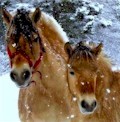Just like in all relationships, communication is also important in horse training. Assuming that a man is more intelligent than a beast, you should be the one to make an effort to listen and understand what your horse is trying to say. Of course, horses cannot speak but they create sounds and have body language. As a horse trainer, you should know what these sounds and body language mean. To give you some horse training tips about this topic, check out the different horse sounds and body language outlined below.
Neighing. This is the most popular hors sound and this could mean that the horse is nervous or confident. This sound is usually accompanied by body language. If the horse is moving agitatedly while neighing, it might be nervous about something. If not, the horse feels confident. If a group of horses is neighing all at the same time, it means they see something strange.
Snorting. Usually, this means that the horse is afraid of something. Or it could also mean that the horse is excited.
Nicker. This is the sound created when the horse's mouth is closed. This means that the horse is glad to see you.
Sighing. Just like people, horses sigh, too. And just like for people, sighing means that the horse is relaxed and feels calm.
Head held high/down low. An upturned head means the horse is uptight while a head bent low means the horse feels very calm and relaxed. One of the most important horse training tips is to teach your horse how to bend its head.
Relaxed/Upturned Ears. Ears also tell a lot about a horse's behavior. Upturned or pinned ears mean disobedience while relaxed ears could mean that the horse is listening and will probably obey.
These horse training tips are important so that you will be able to communicate well with your horse.
